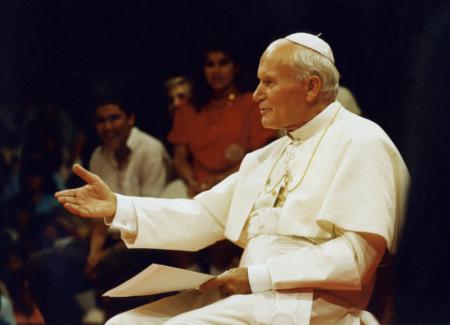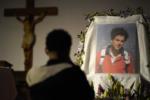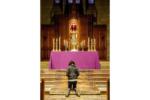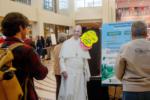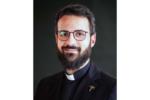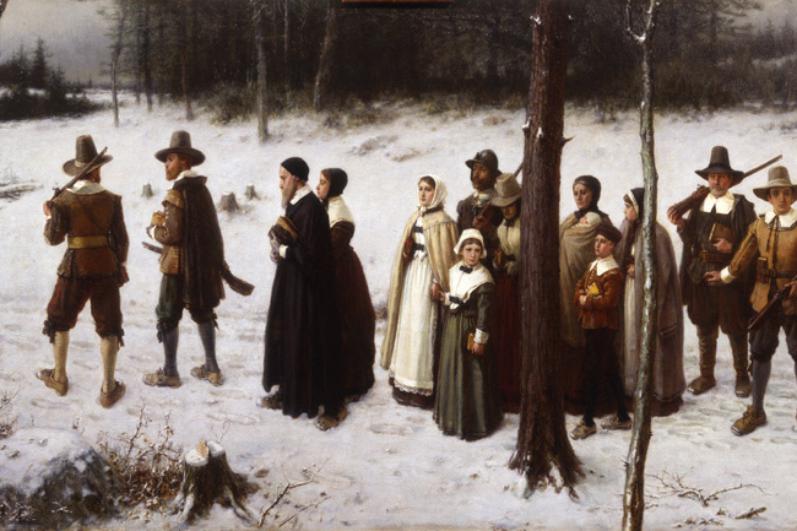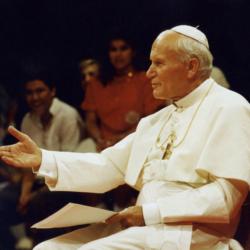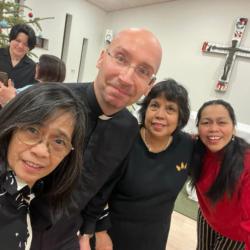A day of gratitude or mourning?
Last December 16, we marked the 400th Anniversary of the Pilgrims' disembarking in Plymouth, Massachusetts, and this year we celebrate the quatercentenary of the first Thanksgiving feast.
It was a brutal first year. Of the 103 pilgrims who had arrived, 52 would die before the long winter was over. Gov. John Carver, their leader, succumbed to fever. Ten of the 17 husbands and fathers, and fourteen of their 17 wives, perished.
The threat of famine was a constant menace until the March arrival of English-speaking Squanto, who taught the emaciated pioneers how to distinguish between poisonous and good plants, to tap maple trees for sap, to fertilize soil with dead fish and to plant corn and beans. When that soil produced a humble harvest a few months later, they organized a feast to thank God who had helped them not just with the food they were blessing, but with survival.
Every year the remembrance of that first thanksgiving is an occasion for families, friends, and indeed our whole country to get together to express gratitude -- for believers, to God; for non-believers, to whoever is listening; for everyone, to each other for much appreciated kindness, love, and solidarity.
In a consumerist age in which we're coaxed to focus more on what we don't have than what we do, when our polarized political and social culture tempts us to criticize far more than compliment, the fourth Thursday of November is an increasingly important opportunity to reset and detoxify.
I become more grateful every November not just for the generosity of God and others, but also for the feast of Thanksgiving itself and the manifold good it occasions.
Catholics pray to God in the heart of every Mass, "It is right and just, our duty and our salvation, always and everywhere to give you thanks." The feast of Thanksgiving allows us to fulfill that sweet and fitting obligation for the gift of life and so much besides. It also opens us up to the various planes of human redemption that can only be received by grateful hearts.
A spirit of gratitude is essential not just to personal flourishing and happiness but to social growth and harmony. Even and especially for those who have experienced suffering and setbacks, who objectively would have plenty of reasons to bemoan or complain, Thanksgiving is a lifeline cast into the pit of self-pity, offering a path of escape as well as the permission and motivation to take it.
But we cannot take this gift of Thanksgiving for granted, as if it will somehow always be with us, passed down from generation to generation, with no effort needed on our part to protect and promote it.
Thanksgiving regularly faces the annual challenges of those who are prevented from coming or choose to absent themselves, from family members who prefer to make it a midweek pseudo-Sabbath of NFL binge-watching, or others who regard it as a prelude to Black Friday binge-spending.
But now, in an era of cancel culture and its push for the historical, cultural and religious parricide of western civilization, Thanksgiving is facing a conceptual attack that shouldn't be underestimated or ignored.
Similar forces to those that have been yanking down statues of Christopher Columbus and changing the second Monday of October to "Indigenous Peoples Day"; who have been besmirching US history as an evil chronicle through the 1619 Project and critical race theory; who are pretending that the great Franciscan missionary Junipero Serra was a sadist rather than a saint; and who have gone after the memories and monuments of George Washington, Thomas Jefferson, Abraham Lincoln, Ulysses S. Grant, Francis Scott Key, Theodore Roosevelt, Frederick Douglass, Lewis and Clark, Mahatma Gandhi, Jesus Christ, and the Blessed Virgin Mary; such fevered mobs are now aiming their iconoclastic and deconstructive crosshairs on Thanksgiving.
In a Nov. 4 feature in the Washington Post entitled, "This tribe helped the Pilgrims survive for their first Thanksgiving. They still regret it 400 years later," author Dana Hedgpeth interviews members of the Wampanoag Tribe on Cape Cod, whose members, she described, are "bracing for the 400th anniversary of the first Pilgrim Thanksgiving in 1621."
For the "Wampanoags and many other American Indians, the fourth Thursday in November is considered a day of mourning, not a day of celebration," she wrote, since all the Wampanoags got from helping the Pilgrims survive was a "slow, unfolding genocide of their people and the taking of their land."
The hyperbolic use of the word "genocide" is not unique to this particular reporter. It is used regularly in interviews of the Wampanoags and other indigenous communities to refer to the arrival of the pilgrims.
Genocide, by definition, involves intent. It is the deliberate killing or harming of a large number of people from a particular nation or ethnic group in order to bring about its physical destruction in whole or part. Rather than those who sought freedom from religious persecution in England who devoutly got together after a brutal year to give thanks to God, the pilgrims are being accused of slow-motion ethnic cleansing. The names of Bradford, Standish, Gardiner, and Carver should be numbered, in other words, alongside Ataturk, Stalin, Hitler, Mao, and Pol Pot.
There are, of course, some who believe this calumny about the pilgrims, like they do about almost any westerner who landed on the shores of the new world. But their outlandish accusations are generally not given credence by reputable outlets like the Washington Post in lengthy features with no quotations from scholarly or contradictory voices.
The first Thanksgiving, Hedgpeth recounts, "turned into a centuries-long disaster for the Mashpee [Wampanoags]." She links the arrival of the pilgrims to the "Great Dying" pandemic that preceded their arrival thanks because of the germs of fisherman from England along the Massachusetts coast, as if they were engaged in biological warfare rather than trying to catch cod.
Hedgpeth derisively makes the point that the Wampanoags weren't even originally invited to the prayerful celebration of the first Thanksgiving but only came after they heard some festive gunshots, misinterpreting them as harbingers of trouble. Having arrived, however, they were invited to stay and share in the feast, which they did, something ultimately complimentary to pilgrims and the Wampanoags both.
But not to Darius Coombs, a Mashpee Wampanoag cultural outreach coordinator, who told Hedgpeth, "For us, Thanksgiving kicked off colonization. Our lives changed dramatically. It brought disease, servitude and so many things that weren't good for Wampanoags and other Indigenous cultures."
In exchange for introducing the "Boat People" to native foodstuffs like turkey, corn, cranberries, pumpkins, raspberries, and blueberries, the Wampanoags, it is implied, received smallpox, cholera, scarlet fever, whooping cough and the common cold. And later dirty water and dirty air. And nothing whatsoever good or even neutral.
Hedgpeth quotes Frank James, "a well-known Aquinnah Wampanoag activist," who called welcoming and befriending the pilgrims as "perhaps our biggest mistake." In 1970, he created a "National Day of Mourning" to replace Thanksgiving and, as Hedgpeth details, "debunk the myths of the holiday." Hedgpeth mentions that this year some Wampanoags will go to Plymouth on Nov. 25 to mark this National Day of Mourning.
Other recent articles have documented efforts to "cancel" Thanksgiving from school curricula or at least to supplant it from a "heart-warming multicultural celebration" to a "cruel reminder of European colonialism," as one 2018 Washington Post described.
There's no question that indigenous peoples have suffered enormously from illnesses, xenophobia, war (among themselves and with settlers), unjust laws and immoral actions against their persons, dignity, traditions, and lands. Those need to be acknowledged, apologized for, repented for and, to the extent possible, justly remedied.
At the same time, such historic sufferings don't provide "carte blanche" for accusing the pilgrims themselves of atrocity crimes, for trying to eliminate the memory of that first thanksgiving harvest feast 400 years ago, or for seeking to transform a much-needed day of national gratefulness and celebration into a day of shame, lament, and national self-loathing.
The best remedy for a culture of grievance is one of gratitude. Even if, like that first Thanksgiving, the Wampanoags were late to the feast, let's never stop inviting them, and others like Dana Hedgpeth, in the hope that they will realize what the rest of us already know: that there is indeed something to celebrate and that it is right and just, our duty and our salvation, always and everywhere to give thanks.
- Father Roger J. Landry is a priest of the Diocese of Fall River, Massachusetts, who works for the Holy See's Permanent Observer Mission to the United Nations.
